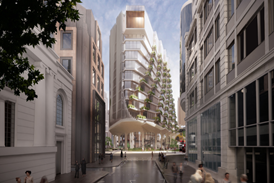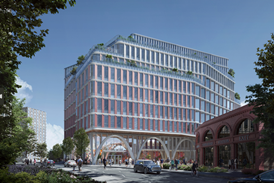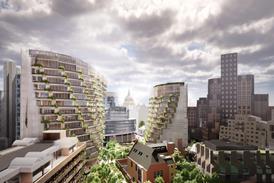Institute demands widest possible remit for investigation
The RIBA is demanding the Grenfell fire inquiry be given the broadest possible remit to examine the overall regulatory and procurement context for construction in the UK.
The inquiry must be given the power to ensure that any systemic issues of design, construction and safety that could have contributed to the disaster are scrutinised.
The institute specifically draws attention to changes to the procurement system which mean architects no longer take a lead design role with responsibility for oversight of the project from start to finish including product specification and inspection of their on-site installation.
The announcement comes as it emerged the same cladding buildup used on Grenfell Tower failed a full-scale test conducted by BRE. It is understood that other tower blocks feature a similar combination of cladding materials and would fail the same test.
The RIBA’s concerns are contained in a five-page written submission setting out its views on what the inquiry, led by Martin Moore-Bick, should cover and the evidence it should obtain.
“While the inquiry must clearly consider the specific sequence of decisions, actions and occurrences that led directly to the events of June 14, the RIBA strongly believes that the terms of reference of the inquiry must be very broadly based,” it said.
The document shies away from making many outright demands but its key points include:
- Changes to procurement mean architects no longer take responsibility for oversight of the project from start to finish including product specification and inspection of on-site installation, a role that has passed to the contractor. The impact of the disappearance of the clerk of works, who takes responsibility for the quality of the work of contractors on site, should also be looked at.
- The effectiveness of building regs should be scrutinised, particularly in terms of the design and construction of the external building envelope and the validity of fire testing data used for building reg compliance where these are not based on full-scale tests.
- The application of fire safety regulations to buildings being refurbished should be examined, including looking at the shortcomings of previous alterations and the role of sprinklers and other fire suppression systems. The RIBA reiterated its previous call for an urgent, fundamental review of Part B, the building regulation covering fire safety. The inquiry should also consider the effectiveness of the compliance regime including building control and enforcement, it said.
- The fire safety regulatory framework governing registered social landlords must be examined and the awareness of tenants of fire safety issues. This includes the possible need for a statutory right of access to inspect the safety of electrical installations.
- The way in which fire brigades get involved in developing building regs and provide input into the design of individual buildings should be reviewed.
- The RIBA also suggested the inquiry might consider taking evidence from independent experts not involved in the development of UK building regs, “perhaps from a recognised authority from outside the UK”.












11 Readers' comments